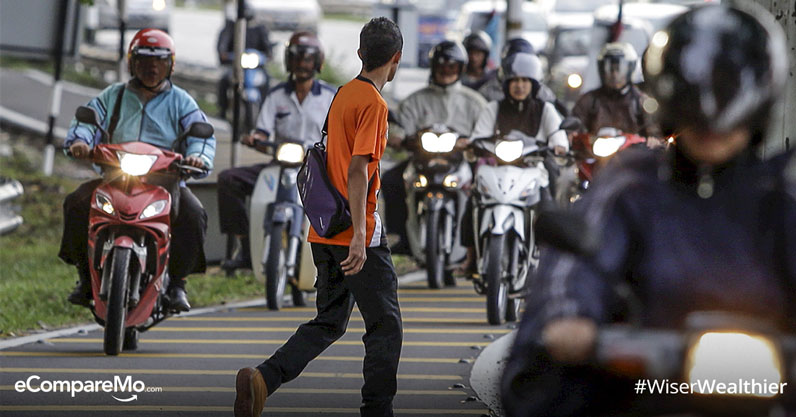4 Reasons The Government Should Regulate ‘Habal-Habal’
4 min readLast year, the Land Transportation Franchising and Regulatory Board (LTFRB) cracked down on Angkas, a transport network company (TNC) that allowed users to book motorcycles as taxis through an app.
Prior to that, the LTRFB had already shut down Grab’s bike taxi operations.
Although the government is putting maximum effort on the clampdown of motorcycle taxi services, the total ban on motorbike taxi TNCs just paved the way for a more primal form of the transport system: the habal-habal.

Habal-habal operators existed long before the advent of the smartphone, yet these illegal operators have stepped up their game. They used social media as a tool to accommodate passengers looking for a convenient two-wheeled taxi ride.
Last Wednesday (April 4), transport advocacy groups revealed the existence of Facebook groups that connect motorcycle drivers and potential passengers.
According to a report by GMA News Online, these Facebook groups have accumulated thousands of members who patronize the service of habal-habal operators.
The group Transport Watch said that “public transportation inadequacy and reliability that have long been under question from the general public†is the reason people continuously patronize these illegal services.
The power of the social network
A quick Google search of “habal-habal Facebook†will yield page-one results for Facebook groups that serve as a meeting place for riders and passengers.
Some of the big groups have even accumulated more than 200,000 members who are looking to beat the traffic through motorcycle taxis.
Another reason for the surge in popularity of the habal-habal is it is much cheaper than getting a taxi, with or without a ride-hailing app.
How does the Facebook group work? For a passenger to book his ride, a potential passenger must post their booking details like time, pickup, and dropoff points.
Eventually, an interested rider will respond to the request and the two will take it to private messaging to negotiate the price. Upon reaching an agreement, the two parties will delete their conversation history and traces of their transaction.
This underground system of habal-habal has attracted the attention of a coalition of transport advocacy groups, with their concerns mainly centering around the safety of the riding public.
According to them, an unregulated industry such as the motorbike taxis is prone to overcharging. Worse, riders are not liable for any injuries of the passenger in case they get involved in an accident.
Without a regulating body and an organization that reins these drivers in, the safety of the passengers is in their own hands.
Now that habal-habal operators and commuters are using technology to find one another, maybe this is the perfect time for the government to look into regulating them instead of outright curbing the industry.
Here are a few reasons:
1. They did it for the TNCs already
In 2015, the Department of Transportation (DOTr) amended Department Order No. 97-1097 in response to the changing landscape of the transport industry. Amid the rise of TNCs like Grab and Uber during that time, they released Department Order No. 2015-011, adding a clause that specifies which vehicles are allowed to operate as a member of the TNCs.
The LTFRB, guided by the Department Order, could now issue regulatory guidelines that would ensure the safety and security of all parties.
2. They have Indonesia as a model example for motorbike TNCs.
Motorcycles are a big part of Southeast Asian traffic, including the Philippines. Indonesia, in an attempt to solve its traffic woes, came up with the ojek, their version of the habal-habal.
In 2015, motorcycle taxis were banned by the Indonesian government. President Joko Widodo overturned that ban within a day.
Widodo said the government must look into the inclusion of such disruptive services instead of restricting them with regard to addressing changes in the transportation industry.
3. Regulation will result in a clear chain of liability
Last year, a passenger of Angkas got into an accident, causing him to sustain critical injuries. After the crash, the said passenger’s hospitalization bills skyrocketed to P1 million. Although Angkas provided financial assistance, the chain of liability was still unclear.
According to LTFRB Memorandum Circular No. 2004-004, public utility vehicles (PUVs) must have personal accident insurance for their passengers. This power was extended to TNCs through the DOTr Department Order No. 2015-011.
4. Customers can have a fairer fare system
With your usual habal-habal system, the rider has the final say on the fare. In Guadalupe, a motorbike service to Poblacion, Makati can cost a passenger somewhere between P70 and P100. Meanwhile, Makati Central Business District workers are charged from P150 to P200 for a ride from the Ayala Station of MRT-3.
With the regulation of the habal-habal, there will be a clear pricing system that won’t be based on the whim of the riders.
To quote the DOTr Department Order No. 2015-011: “Technological innovations are constantly challenging and often transforming established practices of industries.â€
So what do you think? Do you agree that the solution to our transporation woes lies on two wheels?
Sources: Rappler, GMA Network, Department of Transport, Land Transportation Franchising and Regulatory Board
